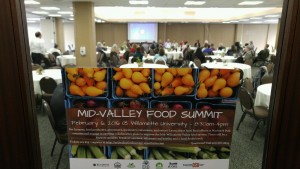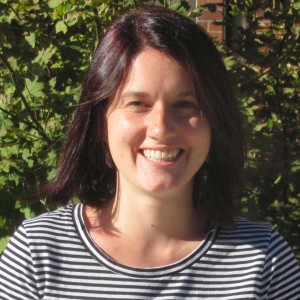By Lexi Stickel

During my first year with RARE I conducted a Community Food Assessment (CFA) for Marion and Polk counties. One of the main opportunities identified through the community organizing process was the need for leadership in regional community food system efforts. Marion and Polk counties are located in the mid-Willamette Valley – to the north lies Portland with a plethora of food systems organizations and to the south lies Albany and Corvallis with Ten Rivers Food Web as well as Eugene with Willamette Farm & Food Coalition. The gap in the Mid-Valley doesn’t mean that there isn’t a lot happening, but it does mean that mostly it’s small efforts that occurring independently of each other. There’s a lot of learning and growth that happens with collaboration. Through the CFA it became clear that community members knew this and wanted more collaboration across the food system.
While creating my work plan for a second year of RARE, we decided that this main opportunity for action should be addressed this year. After brainstorming and researching regional food system growth in other regions across Oregon, we decided to host a regional Food Summit. In my mind, originally this event would look like a large FEAST (Food, Education, Agriculture, Solutions, Together) event. I was thinking about 75 people in attendance and we would all spend the morning and afternoon together brainstorming ways to improve our community food system. It started small and simple in my mind. It quickly grew and grew. With the help of key folks at Marion-Polk Food Share, we brought together an Advisory Committee with folks from across the two county-region who are working across the food system. During our first Advisory Committee meeting, I explained the purpose and goals of the Food Summit as well as our initial vision. We threw out ideas about breakout sessions and keynote presenters. One of the Advisory Committee members asked me how many people I was expecting to attend. I think I shrugged and said that we hoped for 75. People laughed lightly and enthusiastically told me that easily 100 or 150 people would show up to an event like this.
Thus I discovered the intersection between event planning and community organizing. There were logistical challenges like finding an event space and deciding which breakout session should be in what room. There was a daunting amount of work like organizing eight breakout sessions and designing posters and printing posters and hanging up posters across town. It truly wouldn’t have been possible without the help by many staff at Marion-Polk Food Share. Most of our programming team came together early one morning to pick locations across the two counties where they could hang posters. For the next three or four months my life became consumed with event planning details. Many times I cursed this idea – why a Food Summit? It somehow didn’t feel like my time would be best spent consumed with event planning details when I’m supposed to be organizing a community food system. What impact can a one day event really have?
On a Sunday evening, less than a week before the Food Summit I checked my work email and I saw an email from Eventbrite (the website that was managing the registration). The Food Summit had sold out of general admission tickets. We had over 200 people registered for the event by the time the Food Summit happened the following Saturday. The Food Summit was easily defined as a success – we had an amazing turnout, people were engaged throughout the whole day, the feedback was excellent. But it wasn’t until weeks after the Food Summit was over that I started to realize the impact of the event. As emails slowly started to trickle into my inbox and people I’d run into at events around town would pull me aside. They asked questions about what is going to happen next and how can they stay involved and present ideas about possible future partnerships.
The goals of the Food Summit were to bring people together and to inform them about the CFA that was conducted last year. Another goal was to gauge interest in a local food network. Overwhelmingly, people were responsive and excited about a local food network. While I’m not sure of the impact of the Food Summit yet, it is clear to me that it served an important role in organizing the community and that it was well worth all of the time and effort.
Lexi Stickel

Lexi received her bachelor’s degree in International Studies, Spanish, and Journalism with a minor in Latina America Studies from the Clark Honors College at the University of Oregon, and she received her master’s degrees in Conflict and Dispute Resolution and in International Studies with a graduate certificate in Nonprofit Management from the University of Oregon. After receiving her degrees, Lexi lived in San Miguel de Allende, Mexico, for a year, working with the Rural Education Institute of Mexico as Director of Operations. Lexi then completed her first year with RARE AmeriCorps – Resource Assistance for Rural Environments, working as Community Food Systems Coordinator with Marion-Polk Food Share. Now in her second year with RARE, Lexi hopes to expand her skill set to include aspects of community development, programming, and planning, especially in relation to non-profit management. After her second year with rare, Lexi plans to pursue a passionate career working within the Oregon food system to help expand equitable access to under-represented communities.
